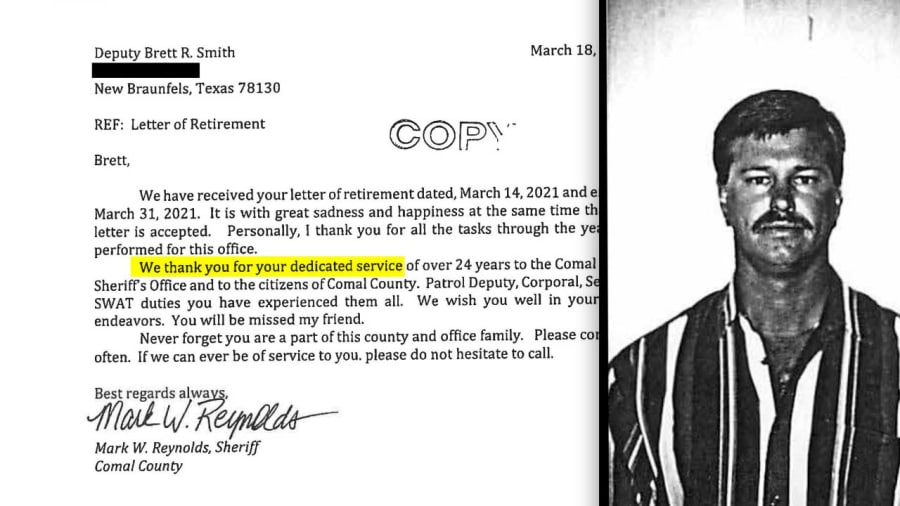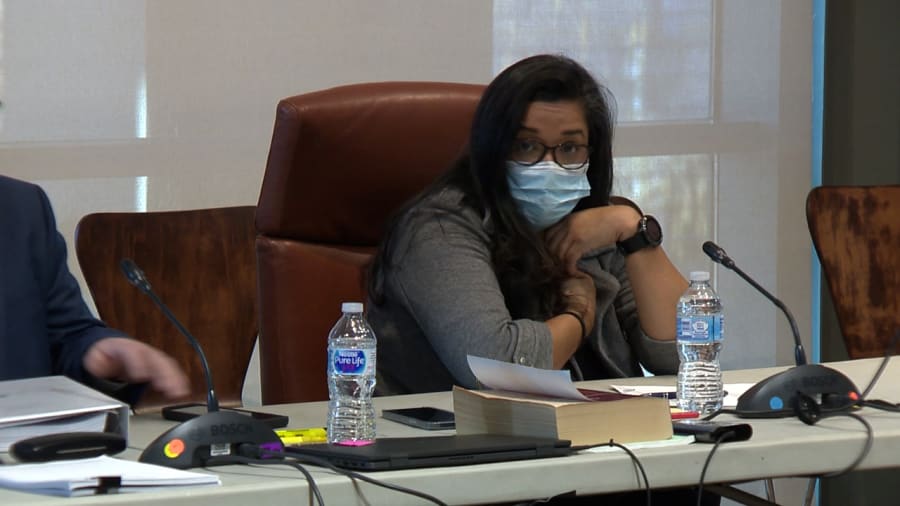COMAL COUNTY, Texas – A male Comal County Sheriff’s Office sergeant who admitted to having a sexual relationship with a subordinate deputy who worked for him at the courthouse complex was allowed to keep his job and retire years later, despite the same agency firing a female sergeant who violated similar rules on employee fraternization, personnel records obtained by KSAT Investigates show.
Sgt. Brett Smith was demoted to the rank of deputy in 2018, ordered to take a county human resources sexual harassment course and was moved from the courthouse to patrol after his affair with a female deputy was investigated by internal affairs.
When Smith informed his administration of his intention to retire in the spring of 2021, Comal County Sheriff Mark Reynolds thanked him for his 24 years of dedicated service to the community.
“It is with great sadness and happiness at the same time that your letter is accepted. You will be missed my friend,” wrote Sheriff Reynolds in a March 2021 letter acknowledging Smith’s intention to retire.
Smith’s discipline case for the sexual relationship ended much differently than that of Comal County Sheriff’s Sgt. Kellie Metz, who was terminated earlier this year after an investigation determined she had failed to disclose an off-duty sexual relationship with a subordinate deputy.
Two discipline cases. Two different outcomes.
Metz, a nearly six-year veteran of CCSO, was terminated on January 19 for rules violations including professional conduct, employee fraternization and use of body-worn cameras.
In early December, CCSO began investigating rumors that Metz and Deputy Patrick Byrne had sexual encounters while on duty.
In May 2022, a suspect identified as David Brakhage told deputies he had thrown a rock at the windshield of Byrne’s patrol vehicle while it was parked near Metz’s patrol vehicle after “he heard moaning sounds like sexual gratification coming from the area of the patrol units,” CCSO records show.
The incident, which took place in the parking lot of the Antler Cafe, led to Brakhage being charged with criminal mischief, records show.
Byrne’s vehicle, however, was never reported to CCSO for a damage assessment and an investigation revealed that neither Byrne nor Metz had turned on their body-worn cameras during the incident.
Brakhage was cleared of criminal wrongdoing for the windshield incident after a non-prosecution affidavit was filed in his case on Jan. 12, records show.
Metz said she was teaching Byrne how to properly conduct felony traffic stops.
While questioned separately by investigators, Byrne and Metz each denied having sex while on duty and the accusation was never proven by IA, Metz’s discipline file shows.

“You see how things just aren’t looking good, when he goes to a small allegation now a big old can of worms are opened up? It doesn’t look good,” an IA investigator told Metz during a taped interview in early January.
Metz, while being questioned by IA, did admit that she and Byrne were intimate at her residence twice between October and November 2020.
She said she did not report the relationship to the CCSO administration, despite being an agency supervisor, because “the two meetings were isolated meetings and there was no intention to pursue anything further,” Metz told IA in an audio statement.
Byrne, while questioned by internal affairs, first denied having been intimate with Metz before changing his story and admitting to the relationship, records show.
The off-duty sexual encounters took place while Metz was in a supervisory capacity and just months after Byrne joined the agency, according to his LinkedIn page and state law enforcement records.
Multiple fellow deputies told internal affairs they became aware of the relationship after Byrne bragged about Metz’s sexual prowess during a BBQ.
Two deputies repeated to IA the exact verbatim of a crass phrase used by Byrne to describe Metz’s ability to perform a specific sex act, records show.
Byrne revealed to investigators that he and Metz met in late December and he revealed to her that he had been questioned about their past sexual encounters.
He told IA investigators Metz asked him to be untruthful.
“I’m not going to lie. I want to keep my job,” Byrne told investigators during an audio statement recorded after he met up with Metz.
“He’s gone on tape and he’s pointing the finger straight at you. This is just a sad state of affairs,” the investigator told Metz on Jan. 4.
Metz eventually admitted to speaking to Byrne about the IA investigation. She told them she felt she was being targeted and had been trying to protect Byrne.
Metz’s termination paperwork notes that she was untruthful with investigators when first asked if she had discussed the investigation with Byrne after being told not to discuss it.
Metz has not responded to requests for comment from KSAT.
KSAT could find no record that Metz has filed an employment claim in state or federal court.
Smith was placed under investigation in January 2018, after a corporal who worked under him secretly recorded two conversations with him and then filed a formal complaint with internal affairs.
The recordings, which were provided to KSAT following a public records request, included several tense moments between the two employees as she confronted him about his sexual relationship with Deputy Kathleen Reyna.
“You have to realize what you’re doing sarge, really. I mean you can’t be like that oblivious that you don’t see how much favoritism you’re showing her,” the corporal told Smith in one of the recordings.
The corporal told Smith she was getting “flak” from other deputies for adjustments made to Reyna’s work schedule.
“I’m pissed off at the both of you for putting me in this position. It’s not fair. You guys can do whatever you want outside of work, but because it’s carrying over here, and people are noticing it and I’m getting questioned about it and they’re thinking I’m covering for you. It’s bullsh**,” said the corporal, who was in charge of handling schedules for deputies assigned to the courthouse.
The released records included subsequent audio interviews with a dozen deputies assigned to the court complex.
Six deputies told internal affairs they had not witnessed improper conduct from Smith and Reyna. Several of them noted they had heard rumors about a possible relationship.
Six other deputies, however, told an internal affairs investigator they had not only witnessed improper conduct from Smith, but believed he showed favoritism to Reyna.
“He reaches over and he caresses, gets his hands in her hair,” one deputy told internal affairs in late January 2018. He added that the relationship was negatively impacting morale at the courthouse.
The deputy recalled a meeting the previous fall in which Smith called deputies in and demanded to know how information about his relationship with Reyna was getting around. Smith told the deputies to “shut it down,” the deputy told an IA investigator.
A second deputy told internal affairs Smith asked him to switch a duty assignment with Reyna only to then tell Reyna it was the deputy’s idea, “which was not true,” the deputy said.
One deputy told internal affairs Reyna’s schedule was modified because she constantly complained of child care issues, but she would then frequently stay late to hang out with Smith at work.
“So it was difficult to come to work because you didn’t know what was going to happen that day,” a third deputy told internal affairs.

Reyna, when questioned by internal affairs, confirmed that Smith showed affection to her while at work but stated they had never engaged in sexual relations while on the clock.
“He’s held my hand before. Touched my arm and he has kissed me on the cheek,” Reyna told internal affairs.
During her late January 2018 interview with IA, Reyna said the sexual relationship with Smith had been over for some time in part because Smith had told her he wanted his marriage to be officially over before starting a relationship with her.
Smith admitted to engaging in a sexual relationship with a subordinate and acknowledged that his conduct was wrong, but denied that he had given her preferential treatment at work, his personnel file states.
Reynolds later wrote that he found no basis for the allegations of favoritism levied against Smith and the alleged violation was tossed out, personnel records show.
Reynolds declined requests from KSAT to be interviewed about different levels of discipline being handed to Smith and Metz.
“That is where I think this case turns.”
The two discipline cases raise questions about whether CCSO showed disparate treatment in its handling of the two supervisors.
The claim, that agencies discipline some officers more harshly than others, has successfully been used by attorneys representing San Antonio police officers in numerous arbitration cases.

But N. Lucy Chukwurah, a Houston-based employment attorney, told KSAT she doesn’t believe that argument applies to these two discipline cases.
Chukwurah does not represent Smith, Metz or anyone who was involved in their employment decision.
She pointed out that Metz’s termination paperwork includes the conclusion from the CCSO administration that the sergeant was untruthful, creating a large hurdle for her to overcome should she file an employment claim.

“A court is going to find that despite the fact they engaged in similar conduct, they fired her anyways for the untruthfulness,” said Chukwurah.
She added that she found credence to Metz’s claim that she did not think she needed to report her sexual encounters with a subordinate, because it did not lead to a relationship.
Chukwurah, however, said she wondered whether Smith was entirely truthful since the internal investigation revealed that Smith also did not report his relationship to superiors.
“They’re just choosing to find the points at which she lied as a reason to terminate,” said Chukwurah.




